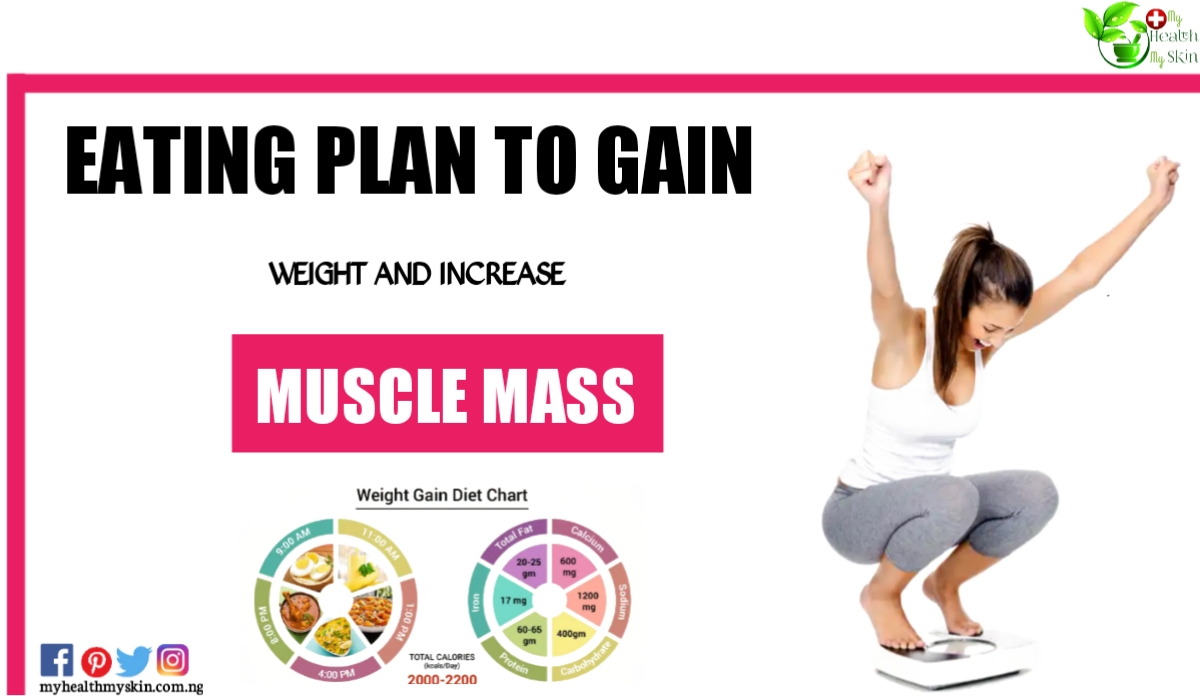An eating plan to gain weight? The truth is that while many struggle to lose weight, others despair of gaining a few pounds to feel better with their body. And, contrary to what many people think, gaining quality weight is not an easy task!
Eating plan to gain weight

Typically, people who have difficulty gaining weight are people with an accelerated metabolism . In other words, they use energy more easily than other people, since they don’t store it. Also genetics or health problems such as hyperthyroidism can make it difficult to gain weight.
On the other hand, most people who feel too thin have a normal or slightly lower body fat percentage. What they really lack is muscle mass.
As such, it is useless to eat foods rich in fat and sugar that will only lead to an increase in fat mass, an undesirable increase that can bring you several health problems. Yes, because don’t be fooled if you think that thin people don’t develop diseases such as dyslipidemia ( high cholesterol or triglycerides), high blood pressure or type II diabetes.
So, whatever your weight, the most important thing is to stay healthy!
So how do you gain weight in a healthy way? The best thing is to follow an eating plan to gain weight prepared by a nutritionist, specific to your needs, and to practice balanced eating habits. In this way, you will increase in weight based on an increase in lean mass, that is, muscle mass.
After all, we must not forget that “we are what we eat” and if we eat “badly” we will never be able to have a good body composition!
Food plan to gain weight

In any diet to gain weight, daily energy intake (calories) must be greater than energy expenditure. Thus, any dietary plan to gain weight should add 500-1000 Kcal to those you usually eat. To achieve this caloric excess it is necessary to eat more meals a day, each with a greater volume of food, and with food to make you fat (healthy!).
In addition, you should spread the calories you consume over 6 to 7 meals a day, so that you eat every 3 hours approximately.
Another important tip is not to drink too much water at meals so as not to fill your stomach too much, preventing the ingestion of more food.
Finally, it is important to emphasize that there is no single eating plan to gain weight that is suitable for all people. What works for one person may not work for another. It is necessary to take into account important factors such as genetics, health problems, body composition, among others.
Likewise, it cannot be said that there are mandatory foods and prohibited foods. Yes, there are more and less recommended foods.
Sample food plan to gain weight (2500-2700 kcal)
Breakfast – 8 am
- 1 whole grain bread (100g) with 1 scrambled egg +
- 1 low-fat liquid yogurt +
- 1 apple
Mid-morning – 10:30 am
- 60g Oats +
- 100g Non-fat Quark Cheese
Lunch – 1pm
- Vegetable soup (no potato)
- Plate: 100g Rice + 100g Chicken breast + 100g Broccoli + 1 tablespoon of olive oil to season +
- 1 Natural fruit juice (no sugar)
Mid-afternoon 1 – 4:30 pm
- 100g Wholemeal bread with 1 slice of low-fat cheese and 1 slice of poultry ham +
- 1 light Greek yogurt +
- Handful of Dried Fruits (Walnuts, Almonds, Hazelnuts)
Mid-afternoon 2 (post training) – 7pm
- 1 packet of chocolate milk +
- 1 boiled egg +
- 1 banana
Note: If you do strength training with the goal of significantly increasing muscle mass, take 1 serving of Whey protein in water + 1 banana as a post-workout.
Dinner – 9 pm
- Vegetable soup (no potatoes) +
- Plate: 100g Grilled salmon + 100g sweet potato + 100g lettuce, tomato, cucumber and carrot salad + 1 tablespoon of olive oil to season
Supper – 11:30 pm
- 150g fresh cheese +
- 1 scoop peanut butter dessert
In fact, to gain weight in a healthy way it is essential to combine physical exercise, balanced diet and rest! And this equation is only successful if it includes these three components!







